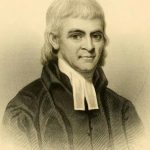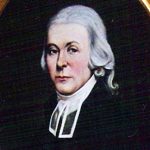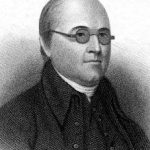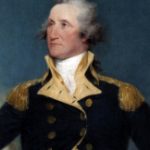 On August 16th, 1777, two hundred and thirty-nine years ago, the Battle of Bennington was fought by a band of volunteers opposing the advance of British General Burgoyne’s army. Among these volunteers was Chaplain Thomas Allen, the “Fighting Parson of Bennington.” Before the battle began, he led his soldiers in prayer that God would grant victory. (In WallBuilders’ collection, you can see a note from him, as well as read a sermon he preached years later.)
On August 16th, 1777, two hundred and thirty-nine years ago, the Battle of Bennington was fought by a band of volunteers opposing the advance of British General Burgoyne’s army. Among these volunteers was Chaplain Thomas Allen, the “Fighting Parson of Bennington.” Before the battle began, he led his soldiers in prayer that God would grant victory. (In WallBuilders’ collection, you can see a note from him, as well as read a sermon he preached years later.)
Other notable chaplains in the War for Independence included Benjamin Trumbull, who in one battle sat on his horse in full view of the enemy, firing his musket and ducking behind the horse’s neck if ever a bullet came close.
Samuel Spring was another courageous chaplain, serving as part of the 1775 expedition into Quebec with Arnold’s army. Before deploying, he preached a sermon to the troops from Exodus 33:15: “Lord if your Spirit does not go with us, then do not send us.” Spring starved along with the rest of the army on the mission, and they all rejoiced when a moose was finally shot to help relieve their extreme hunger.
was another courageous chaplain, serving as part of the 1775 expedition into Quebec with Arnold’s army. Before deploying, he preached a sermon to the troops from Exodus 33:15: “Lord if your Spirit does not go with us, then do not send us.” Spring starved along with the rest of the army on the mission, and they all rejoiced when a moose was finally shot to help relieve their extreme hunger.
The Rev. William Emerson was at the Battle of Concord in 1775 to help spiritually encourage those fighting the British. Dressed in his black clerical robes, and with his musket in hand, he exhorted the others, “Let us stand our ground! If we die, let us die here!” Encouraging a frightened 18-year-old, he told him, “Stand your ground, Harry! Your cause is just, and God will bless you!”
 Timothy Dwight (pictured on the left), who had read the Bible by age 4 and began a self study of Latin at age 6, volunteered for the Continental Army when his college was threatened by the British. He once preached a sermon to the troops that was so relevant to what was specifically occurring at that time that American General Israel Putnam actually questioned whether his text was in the Bible or whether he had invented it; it was indeed from the Bible.
Timothy Dwight (pictured on the left), who had read the Bible by age 4 and began a self study of Latin at age 6, volunteered for the Continental Army when his college was threatened by the British. He once preached a sermon to the troops that was so relevant to what was specifically occurring at that time that American General Israel Putnam actually questioned whether his text was in the Bible or whether he had invented it; it was indeed from the Bible.
There are numerous other notable chaplains in the Revolution, including signer of the Declaration, Robert Treat Paine. You can read some of their sermons in WallBuilders’ library as well as learn more about their astounding lives and deeds.
 An ardent champion of military chaplains was George Washington. One of the first things he did as a young officer in the French and Indian War was to petition Virginia Governor Robert Dinwiddie to provide a chaplain for the troops. When Dinwiddie refused, Washington himself filled that role. When he became Commander-in-Chief during the Revolution, he issued several general orders respecting chaplains — such as this one from 1777 referencing a Day of Thanksgiving declared by the Continental Congress.
An ardent champion of military chaplains was George Washington. One of the first things he did as a young officer in the French and Indian War was to petition Virginia Governor Robert Dinwiddie to provide a chaplain for the troops. When Dinwiddie refused, Washington himself filled that role. When he became Commander-in-Chief during the Revolution, he issued several general orders respecting chaplains — such as this one from 1777 referencing a Day of Thanksgiving declared by the Continental Congress.
America has a long, proud history of military chaplains, but today they are under attack (see many examples here). On the week of the anniversary of the Battle of Bennington, let’s remember the long history of our military chaplains and pray for and support those chaplains that serve our Armed Forces today.
Still looking for answers? Visit our FAQ page
More Resources
Know the Truth and Protect Your Freedoms.
Still looking for answers? Visit our FAQ page
Stay Informed with the Latest Resources
Enter your email address to receive our regular newsletter, with important information and updates right in your inbox!










